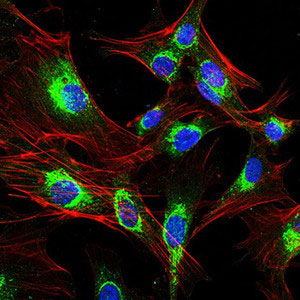By

Image shows expression of NUCB2 in immune cells. NUCB2 is a gene that provides a check on inflammation in obesity.In the search for obesity treatments, scientists recently zeroed in on a gene known as Nucleobindin-2 (Nucb2), which was believed to play a role in satiety. However, in a new study published in Cell Reports, Yale researchers uncovered an unexpected function for the gene in reducing inflammation.
To better understand the role of Nucb2, a research team led by Vishwa Deep Dixit, the Waldemar Von Zedtwitz Professor of Comparative Medicine and professor of immunobiology, examined the gene — and the protein it encodes — in cells and in several mice models. They deleted the gene first from whole animal, then specifically from neurons, fat cells, and immune cells. When they removed the gene from immune cells known as macrophages, and fed the mice a high-fat diet, the macrophages produced inflammation, which in turn caused insulin resistance in the animals lacking Nucb2. Insulin resistance can be caused by obesity and is a precursor for diabetes.
The findings suggest that Nucb2 has no role in satiety, but rather has a key function in the immune system. “What our study does is clarify the physiological function of Nucb2,” said Dixit. “It has nothing to do with food intake. Its primary function is to control inflammation by regulating macrophage activation in fat tissue.” Future studies should explore further how inflammation, immunity, and metabolism are linked, and whether Nucb2 can be targeted by drug therapy to reduce insulin-resistance in obesity, said Dixit.
The other authors are Anthony Ravussin, Yun-Hee Youm, Jil Sander, Seungjin Ryu, Kim Nguyen, Luis Varela, Gerald I. Shulman, Sviatoslav Sidorov, Tamas L. Horvath, and Joachim L. Schultze. The study was supported in part by the National Institutes of Health and the Glenn Foundation.
Publication: Anthony Ravussin, et al., “Loss of Nucleobindin-2 Causes Insulin Resistance in Obesity without Impacting Satiety or Adiposity,” Cell Reports, 2018; DOI:10.1016/j.celrep.2018.06.112


Your Opinion is valid .